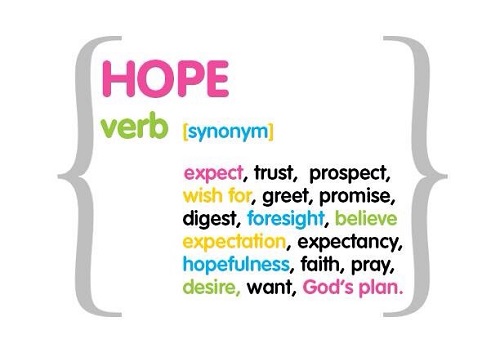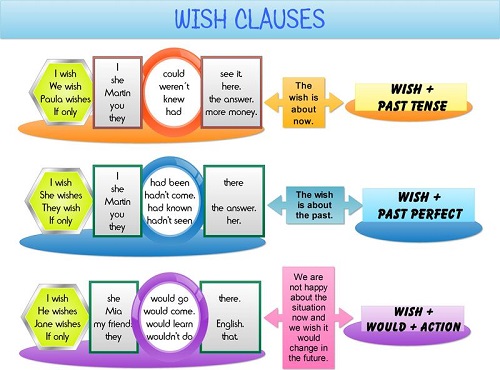Difference Between Hope and Wish

Hope vs. Wish
Wishes are for genies. Hopes are for the dreamers. Easy for most people to say; hard for some to understand.
Most people get confused about the proper usage of the words “hope” and “wish” as they speak of things they would like or not like to happen. Some wish to have wings, while others hope to be successful in business. Some wish to see a real genie, while others hope to pass the board exam. That being said, the differences between the two words can be easily identified.
According to the Webster Dictionary, the term “wish” can be defined as “a term that refers to a desire or point to something that one longs to have.” It is usually followed by an infinitive or a clause, such as in the example, “I wish to travel tomorrow.”
“Hope,” on the other hand, is used in a conversation conveying a possibility of an event that one looks forward to. The difference between “hope” and “wish” is that “hope” is backed by a reasonable confidence about the desire. Hope is also used to refer to something positive and doable.
Simply put, the main difference between the two lies in the probability or likelihood of a person’s desires coming true. We wish for something when it’s unlikely or impossible to be carried out. We hope for things that are possible and likely to happen or be achieved.
“Wish” is used during desperate events (i.e. one has a deep longing for something with a slim possibility of happening). It is also often used when expressing a desire coupled with clear sarcasm. “Hope,” on the other hand, is used when one is confident that the desired events have a high possibility of occurring.

Take these two sentences, for example: “John wishes he could pass the exam” and “John hopes he passes the exam.” In the first sentence, John has this impossible desire to pass the exam, but he doesn’t think he can do it, meaning he’s hopeless – so he wishes. On the other hand, the second sentence implies that John thinks it is likely for him to pass the exam, but there are still some chances of failing it, so he hopes for his success.
Formulating sentences with the words “wish” and “hope” also takes on different rules depending on the forms of the verb used in the sentence. When making a wish, one should use the past tense of the verb:
I wish I belonged in the top ten of my class. (But I do not)
Most parents wish they had genius kids. (But they do not)
When making a wish about the past, use the past perfect tense of the verb:
Mary wishes she had spent more time studying rather than chatting with her boyfriend. (But she did not)
I wish I had learned to drive early. (But I did not)
Using “hope,” on the other hand, requires the use of the usual sequence of tense rules when referring to the future while taking a past or present perspective. Most frequently, the verb “hope” and the verb in the noun clause are in simple present tense.
I hope he wins. / I hope he will win.
My family hopes you come back. / My family hopes you will come back. (Soon can also be used – My family hopes you’ll come back soon.)
Aaron’s little sister hopes she becomes like her big brother when she grows up.
Simply put, “wish” should be used when referring to a desire with little to no chances of coming true. Conversely, “hope” should be used in a sentence that implies a longing for things or events that are highly probable.
Summary:
1.Both “hope” and “wish” are used to express longing and desire.
2.Using “wish” is more proper when referring to impossible or unlikely events, while “hope” conveys reasonable confidence.
3.The verb tenses used in a sentence with “wish” take on different rules based on perspective. Using “hope,” on the other hand, generally follows the simple tense of the verb.
- Differences Between Fraternity And Sorority - January 8, 2014
- Differences Between Lucite and Plastic - January 7, 2014
- Differences Between Oil and Butter - January 6, 2014
Read More ESL Articles
Search DifferenceBetween.net :
 Email This Post
: If you like this article or our site. Please spread the word. Share it with your friends/family.
Email This Post
: If you like this article or our site. Please spread the word. Share it with your friends/family.
5 Comments
Leave a Response
References :
[0]https://www.flickr.com/photos/amenflickr/9167698358/
[1]http://valentineoi.wikispaces.com/Grammar?responseToken=00691c19d6a306fd6ce2403d05ed87378


o.k
fruitful explanation and aim satisfied with this information.
It’s awesome to pay a visit this web page and reading the
views of all mates on the topic of this paragraph, while I am also eager of getting knowledge.
But then why people say I wish you a merry Christmas?
thank you for this beautiful explenation
I’m still confused for “I wish you a merry Christmas and Happy New Year”? If it’s unlikely to happen, how can we greet people with it?